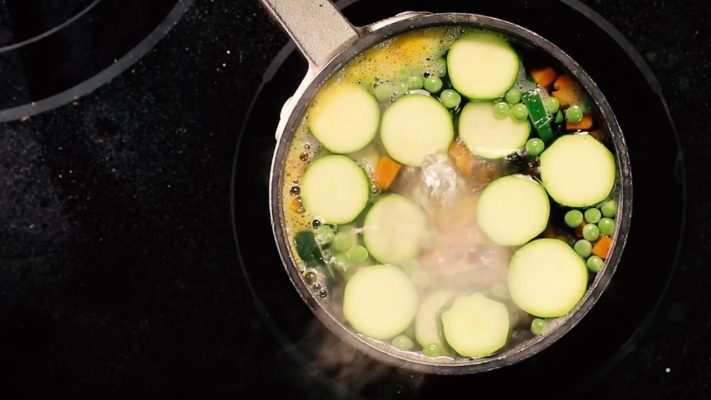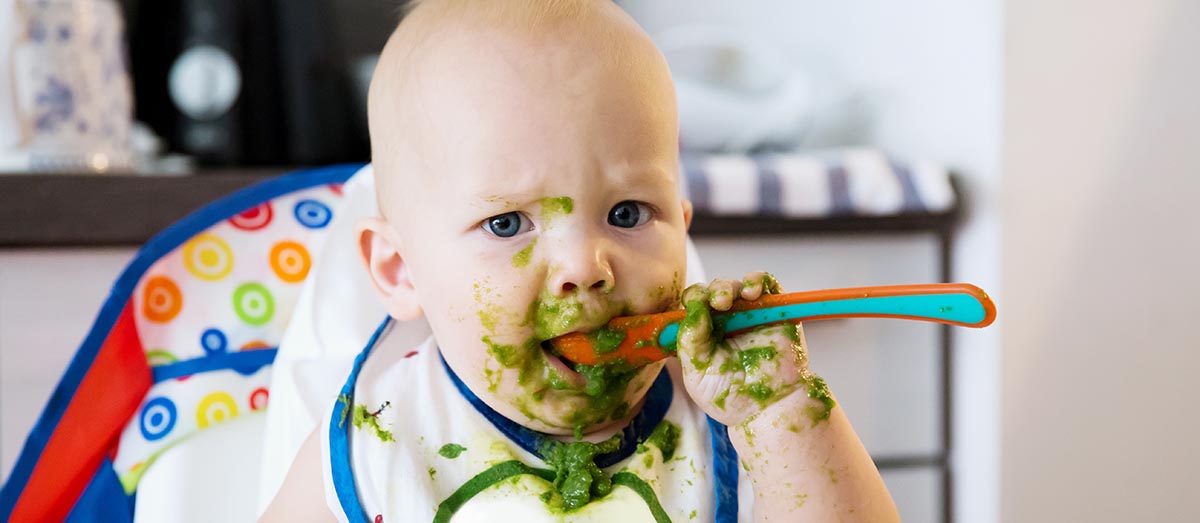The first year of a baby’s life is full of exciting milestones and parenting challenges. A baby’s first solid food experience is often a little of both!
When I’m talking to new parents about their baby’s nutrition and particularly the transition from liquid foods to solids, I often sense that parents are uneasy about the new foods. It’s a big change and there are a few rules, but it’s also a ton of fun to try new things!
Here are several of the topics we often discuss with parents as they’re getting ready to introduce new foods to a baby’s diet:
When to introduce solid foods
According to the American Academy of Pediatrics you should start feeding your baby solid foods between the ages of four and six months. If you start earlier than four months there is a good chance your baby won’t be ready developmentally. If your baby can sit up and hold their head up, they’re probably ready to start eating solid foods. They need to reach these physical milestones first to lower the risk of choking.

Another good clue is when your baby starts showing interest in food when watching you eat. They do this by following your eating motions with their eyes or even reaching for the food themselves!
I’ve found that if you wait past the six month mark to introduce solid foods the process becomes harder on the baby. Kids who are introduced to solid foods after this period can tend to be pickier eaters when they get older. Research also tells us that to help reduce the risk of food allergy, it may be better to introduce food earlier rather than later or avoiding it.
If you have a question about whether your child is ready to try baby food you should always ask your pediatrician.
What about teeth?
Babies don’t always have teeth when they’re physically ready to start eating solid foods. The good news is they don’t need teeth to eat pureed first foods. The food you give your baby should be pureed in a way that takes out any chunks and is easy to eat without the need for teeth to break it down. Think of eating applesauce. Even as adults this is a food that really doesn’t require teeth to eat.
What to look for at the store
Many parents like to start their baby on fruits or vegetables. This makes sense because those types of foods have a very mild flavor compared to meats. Fruits are often sweet and quickly become favorites, making them a good introductory food.
But variety is also important and as your baby eats more foods, introduce meat as well. Pureed meat may not look appetizing, but it is actually very beneficial to your baby. Meats are a great source if iron for your baby and we continue to learn more about the neurological and immune benefits of an iron-rich diet.
Food allergies
When starting your baby on different foods it’s important to do it in a way that protects them from food allergies. You won’t be able to tell if your baby is allergic to a food until they try it. But if they do have a reaction there are things you can do to make sure you know what caused it.
I recommend staying with one type of food for three consecutive days before you introduce something new. That way if your baby has an allergic reaction, you will know what caused it.
For that same reason you should avoid foods with mixed ingredients until you have tried each food individually for three days. For example, if you’re going to give your baby a chicken and rice puree you should already know that your baby is not allergic to either chicken or rice.
Allergic reactions to food could include hives, vomiting, or anaphylaxis. If your baby has a more mild allergic reaction to food, such as hives, the first thing you should do is check in with your pediatrician. If it is a more severe reaction, like anaphylaxis where they are having trouble breathing, make sure to get your child to an emergency room right away.
How to make your own baby food
Many parents want to know exactly what their child is eating during the first few months of life. One way to do that is by making your own baby food. If you’re willing to take the time to do it right, this can be a great option for families and provides peace-of-mind that nothing artificial has been added to the food you’re giving your baby.
If you want to give it a shot, fruits and vegetables are easy foods to try first. For most vegetables you simply boil them. This softens the vegetables so that they can be easily pureed in a food processor.
If you are making food for your baby it is critical that any choking hazards have been removed through the puree process, so make sure you check the consistency of each new food you make
This time of new foods and adorable baby faces as your child reacts to first tastes is tons of fun and should be! Your baby is getting older and this is an important milestone. If you’re stressed about it, try not to be, relax and go at your own pace. You do not need to introduce foods the day your baby is 4 months old–every baby and every parent is ready in their own time. Watch for your baby to be sitting up, holding his or her head up consistently, and showing interest as they watch you eat as your indication that your baby is ready developmentally.





